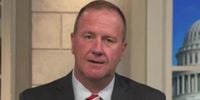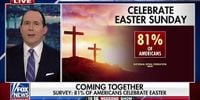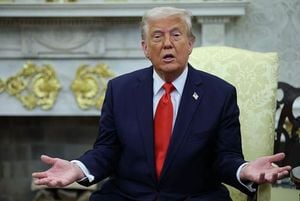Missouri Republican Senator Eric Schmitt is making headlines with his recent proposal to establish Easter Monday as a federal holiday, a move he claims is designed to benefit families and workers across the nation. Introduced on April 14, 2025, the Easter Monday Act seeks to provide Americans with a much-needed three-day weekend during a traditionally sparse holiday period between the Christmas holidays and Memorial Day.
Schmitt argues that this initiative is not merely a partisan effort but rather a celebration of American traditions that resonate with a significant portion of the population. "Despite only two-thirds of Americans identifying as Christian, more than 80% of Americans celebrate Easter each year," Schmitt stated, emphasizing the widespread recognition of the holiday. He further claims that the absence of a federal Easter holiday limits the ability of Americans to gather with friends, family, and church communities during this important time.
According to Schmitt, the introduction of Easter Monday as a federal holiday could potentially extend the economic impact of the Easter weekend, with estimates suggesting an additional $1.5 to $2 billion in travel spending. This economic boost is seen as a win for families who may wish to travel to be with loved ones during the holiday.
However, the proposal has sparked a debate about its implications, particularly regarding the notion of faith and national identity. Critics argue that while Schmitt presents the holiday as inclusive, it may inadvertently promote a form of Christian nationalism that could alienate those who do not share the same beliefs. "Our holidays and traditions are part of the story we tell about ourselves," Schmitt remarked in a social media post, framing the holiday as an integral part of American culture. Yet, many question whose faith is being celebrated and whether the holiday truly reflects the diversity of the American populace.
Schmitt's assertion that the holiday is an "American holiday" raises concerns about exclusion. Observers note that while many Americans celebrate Easter, there are also significant numbers of individuals who do not participate in this Christian tradition. For instance, there are Jews, Muslims, atheists, and agnostics who may feel marginalized by the notion that Easter Monday should be a federal holiday. The senator's comments on social media, where he dismissed other observances as "boutique left-wing micro-holidays," have also drawn criticism for their divisive tone.
Despite the controversy, there is an argument to be made for the practicality of an Easter Monday holiday. Schmitt points out that April and May are the only months without a federal holiday, making this proposal a logical addition to the calendar. The potential for a three-day weekend could provide much-needed rest for workers and families during a time when there are few breaks from the hustle and bustle of everyday life.
As Schmitt continues to advocate for the Easter Monday Act, he faces the challenge of convincing both lawmakers and the public that the holiday can be beneficial without excluding those who do not celebrate Easter. The senator's proposal has garnered attention not only for its content but also for its timing, as it arrives in a political climate where issues of faith and identity are increasingly contentious.
In a country that prides itself on its diversity, the push for Easter Monday as a federal holiday raises important questions about how holidays are defined and who gets to celebrate them. The senator's vision of an "American holiday" may resonate with many, but it also risks alienating those who do not share in that particular interpretation of American identity.
As discussions around the Easter Monday Act unfold, it will be crucial for lawmakers to consider the broader implications of the proposal. Will this holiday truly serve the interests of all Americans, or will it perpetuate divisions among different faiths and beliefs? Only time will tell as the bill moves forward and the public weighs in on this potentially transformative legislation.





